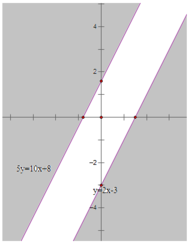
Hãy nhập câu hỏi của bạn vào đây, nếu là tài khoản VIP, bạn sẽ được ưu tiên trả lời.




Điều kiện xác định: 2x – 1 ≠ 0 ⇔ x ≠ 1/2.
Quy đồng và bỏ mẫu chung ta được:
Phương trình (2) ⇔ 2(3x2 – 2x + 3) = (2x – 1)(3x – 5)
⇔ 6x2 – 4x + 6 = 6x2 – 10x – 3x + 5
⇔ 9x = –1
⇔ x = –1/9 (thỏa mãn đkxđ)
Vậy phương trình có nghiệm là x = –1/9.

a/ Nhận thấy \(x=0\) không phải nghiệm, chia 2 vế cho \(x^2\)
\(\Leftrightarrow2x^2+3x+5+\frac{3}{x}+\frac{2}{x^2}=0\)
\(\Leftrightarrow2\left(x^2+\frac{1}{x^2}\right)+3\left(x+\frac{1}{x}\right)+5=0\)
Đặt \(x+\frac{1}{x}=a\Rightarrow x^2+\frac{1}{x^2}=a^2-2\) (\(\left|a\right|\ge2\))
\(\Leftrightarrow2\left(a^2-2\right)+3a+5=0\)
\(\Leftrightarrow2a^2+3a+1=0\Rightarrow\left[{}\begin{matrix}a=-1\left(l\right)\\a=-\frac{1}{2}\left(l\right)\end{matrix}\right.\)
Phương trình vô nghiệm
b/ Số hạng cuối là 4 hay 16 bạn? 4 thì mình ko giải được, phân tách casio cũng ko được
c/ ĐKXĐ:\(\left[{}\begin{matrix}-2\le x\le-1\\x\ge2\end{matrix}\right.\)
\(\Leftrightarrow2x^2+x+2-5\sqrt{\left(x-2\right)\left(x+1\right)\left(x+2\right)}=0\)
\(\Leftrightarrow2\left(x^2-x-2\right)+3\left(x+2\right)-5\sqrt{\left(x^2-x-2\right)\left(x+2\right)}=0\)
Đặt \(\left\{{}\begin{matrix}\sqrt{x^2-x-2}=a\\\sqrt{x+2}=b\end{matrix}\right.\)
\(\Leftrightarrow2a^2+3b^2-5ab=0\Leftrightarrow\left(a-b\right)\left(2a-3b\right)=0\)
\(\Leftrightarrow\left[{}\begin{matrix}a=b\\2a=3b\end{matrix}\right.\) \(\Leftrightarrow\left[{}\begin{matrix}\sqrt{x^2-x-2}=\sqrt{x+2}\\2\sqrt{x^2-x-2}=3\sqrt{x+2}\end{matrix}\right.\)
\(\Leftrightarrow\left[{}\begin{matrix}x^2-x-2=x+2\\4\left(x^2-x-2\right)=9\left(x+2\right)\end{matrix}\right.\) \(\Leftrightarrow...\)

\(ĐKXĐ:\hept{\begin{cases}x^2-8x+15\ge0\\x^2+2x-15\ge0\\4x^2-18x+18\ge0\end{cases}}\Leftrightarrow\hept{\begin{cases}x\ge5\\x\le-5\\x=3\end{cases}}\)
Với x = 8 thì (*) thỏa mãn \(\Rightarrow x=3\)là 1 nghiệm của bất phương trình.
\(\left(^∗\right)\Leftrightarrow\sqrt{\left(x-5\right)\left(x-3\right)}+\sqrt{\left(x+5\right)\left(x-3\right)}\le\sqrt{\left(x-3\right)\left(4x-6\right)}\)(1)
Với \(x\ge5\Rightarrow x-3\ge2>0\)hay \(x-3>0\)thì
\(\left(1\right)\Leftrightarrow\sqrt{x-5}+\sqrt{x+5}\le\sqrt{4x-6}\)\(\Leftrightarrow2x+2\sqrt{x^2-25}\le4x-6\)
\(\Leftrightarrow\sqrt{x^2-25}\le x-3\Leftrightarrow x^2-25=x^2-6x+9\Leftrightarrow x\le\frac{17}{3}\)
\(\Rightarrow5\le x\le\frac{17}{3}\)
Với \(x\le-5\Leftrightarrow-x\ge5\Leftrightarrow3-x\ge8>0\)hay \(x\le-5\Leftrightarrow-x\ge5\Leftrightarrow3-x>0\)thì
\(\left(1\right)\Leftrightarrow\sqrt{\left(5-x\right)\left(3-x\right)}+\sqrt{\left(-5-x\right)\left(3-x\right)}\)
\(\le\sqrt{\left(3-x\right)\left(4-6x\right)}\)
\(\Leftrightarrow\sqrt{5-x}+\sqrt{-x-5}\le\sqrt{6-4x}\)
\(\Leftrightarrow-2x+2\sqrt{\left(5-x\right)\left(-x-5\right)}\le6-4x\)
\(\Leftrightarrow\sqrt{x^2-25}\le3-x\Leftrightarrow x^2-25\le x^2-6x+9\)
\(\Leftrightarrow x\le\frac{17}{3}\Rightarrow x\le-5\)
Từ đó suy ra tập nghiệm của bpt là \(x\in(-\infty;-5]\mu\left\{3\right\}\mu\left[5;\frac{17}{3}\right]\)

Điều kiện \(\begin{cases}x-1\ge0\\19-x\ge0\end{cases}\) \(\Leftrightarrow\) \(x\in\left[1;19\right]\)
Ta thấy ngay phương trình có nghiệm x=10
Nghiệm này thuộc \(\left[1;19\right]\)
Mặt khác, đặt \(f\left(x\right)=x^2+2x+\sqrt{x-1}\)
\(g\left(x\right)=\frac{1000}{x}+\sqrt{19-x}+20\)
Ta dễ dàng kiểm tra \(f\left(x\right)\) là hàm số đồng biến, \(g\left(x\right)\) là hàm số dị biến trên \(\left[1;19\right]\)
Vậy \(x=10\) là nghiệm duy nhất của phương trình



Vẽ các đường thẳng:
(d1): 2x – y = 3 hay y = 2x – 3
(d2): -10x + 5y = 8 hay 5y = 10x + 8
Lấy điểm O(0;0), ta thấy O không thuộc cả 2 đường thẳng trên và 2.0-0 ≤ 3 và - 10.0 + 5.0 ≤ 8 nên phần được giới hạn bởi 2 đường thẳng trên chứa điểm O( phần ko tô đậm) là nghiệm của hệ bất phương trình.


a/ ĐKXĐ: \(x\ge\frac{1}{2}\)
\(\Leftrightarrow x^2-2x+1-\left(x-\sqrt{2x-1}\right)=0\)
\(\Leftrightarrow\left(x^2-2x+1\right)\left(1-\frac{1}{x+\sqrt{2x-1}}\right)=0\)
\(\Leftrightarrow\left[{}\begin{matrix}x=1\\x+\sqrt{2x-1}=1\left(1\right)\end{matrix}\right.\)
\(\left(1\right)\Leftrightarrow\sqrt{2x-1}=1-x\) (\(x\le1\))
\(\Leftrightarrow2x-1=x^2-2x+1\)
\(\Leftrightarrow x^2-4x+2=0\Rightarrow\left[{}\begin{matrix}x=2+\sqrt{2}\left(l\right)\\x=2-\sqrt{2}\end{matrix}\right.\)
b/ Nhìn cái mẫu đã nản rồi, bỏ qua :(
c/ ĐKXĐ: \(x\ge\frac{2}{3}\)
\(\sqrt{3x-2}-1+\sqrt[3]{x}-1=0\)
\(\Leftrightarrow\frac{3\left(x-1\right)}{\sqrt{3x-2}+1}+\frac{x-1}{\sqrt[3]{x^2}+\sqrt[3]{x}+1}=0\)
\(\Leftrightarrow\left(x-1\right)\left(\frac{3}{\sqrt{3x-2}+1}+\frac{1}{\sqrt[3]{x^2}+\sqrt[3]{x}+1}\right)=0\)
\(\Rightarrow x=1\)
c/ \(\Leftrightarrow3\sqrt[3]{x}-3+\sqrt{x^2+8}-3=\sqrt{x^2+15}-4\)
\(\Leftrightarrow\frac{3\left(x-1\right)}{\sqrt[3]{x^2}+\sqrt[3]{x}+1}+\frac{x^2-1}{\sqrt{x^2+8}+3}=\frac{x^2-1}{\sqrt{x^2+15}+4}\)
\(\Leftrightarrow\left(x-1\right)\left(\frac{3}{\sqrt[3]{x^2}+\sqrt[3]{x}+1}+\frac{x+1}{\sqrt{x^2+8}+3}-\frac{x+1}{\sqrt{x^2+15}+4}\right)=0\)
\(\Leftrightarrow x=1\)
Cái ngoặc to kia luôn dương, nhưng chứng minh chắc hơi mệt

\(\Leftrightarrow\frac{7x+4}{\sqrt{2\left(x-1\right)\left(x+1\right)}}+\frac{2\sqrt{2x+1}}{\sqrt{2\left(x+1\right)}}=3+\frac{3\sqrt{2x+1}}{\sqrt{x-1}}\)
\(\Leftrightarrow7x+4+2\sqrt{\left(2x+1\right)\left(x-1\right)}=3\sqrt{2\left(x-1\right)\left(x+1\right)}+3\sqrt{2\left(2x+1\right)\left(x+1\right)}\)
\(\Leftrightarrow\left(7x+4+\sqrt{8x^2-4x-4}\right)^2=\left(\sqrt{18x^2-18}+\sqrt{36^2+54x+18}\right)^2\)
\(\Leftrightarrow\left(7x+4\right)^2+8x^2-4x-4+2\left(7x+4\right)\sqrt{8x^2-4x-4}\)\(=18x^2-18+36x^2+54x+18+2\sqrt{\left(18x^2-18\right)\left(36x^2+54x+18\right)}\)
\(\Leftrightarrow3x^2-2x+12+4\left(7x+4\right)\sqrt{\left(x-1\right)\left(2x+1\right)}=36\left(x+1\right)\sqrt{\left(x-1\right)\left(2x+1\right)}\)
\(\Leftrightarrow3x^2-2x+12=4\left(2x+5\right)\sqrt{\left(x-1\right)\left(2x+1\right)}\)
\(\Leftrightarrow\left(3x^2-2x+12\right)^2=16\left(2x+5\right)^2\left(x-1\right)\left(2x+1\right)\)
\(\Leftrightarrow119x^4+588x^3+1940x^2-672x-544=0\left(1\right)\)
Ta thấy x>1 => Vế trái (1) \(>119.1^4+588.1^3+1940.1^2-672.1-544=1431>0\)
=> pt vô nghiệm.
\(\sqrt{2x+15}=32x^2+32x-20\)(1)
ĐK : \(x\ge-\dfrac{15}{2}\)
\(\left(1\right)\Leftrightarrow\sqrt{2x+15}-4=32x^2+32x-24\)
\(\Leftrightarrow\dfrac{2x-1}{\sqrt{2x+15}+4}=\left(2x-1\right)\left(2x+3\right)\)
\(\Leftrightarrow\left(2x-1\right)\left(\dfrac{1}{\sqrt{2x+15}+4}-\left(2x+3\right)\right)=0\)
Làm tiếp nhé!!